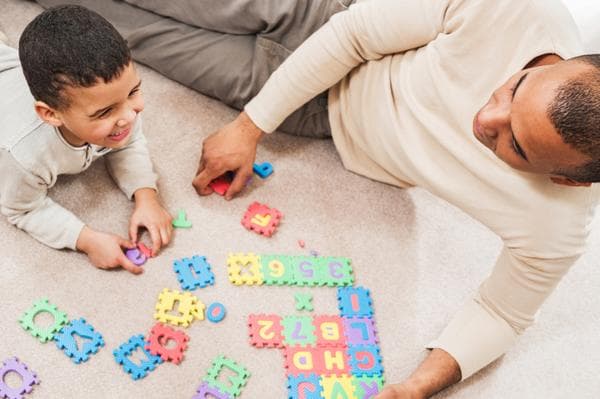


How to Teach Your 3‑Year‑Old to Read

The fun and interactive Reading Eggs program will help your 3‑year‑old take their first steps in learning to read. Free trial
Help your 3‑year‑old learn to read with Reading Eggs!
Reading Eggs is the multi‑award winning reading app that helps children aged 2–13 learn how to read. Designed by experienced educators, the fun‑filled program is the perfect way to build your 3‑year‑old's phonics and phonemic awareness skills at home.
Around the ages of 3 and 4, parents can look forward to watching their child achieve their very first reading milestones.
It might include things like pointing out familiar words or letter sounds, retelling stories that have been read to them, or even making up silly rhymes.
This stage in your child's development is all about giving them the best possible start in their reading journey. These years are critical to reading development so it's important to make sure learning is made fun, rewarding and encouraging.
These years are full of imagination, exploration and play – things to keep in mind when introducing early reading skills to your child. Above all, focus on sharing the joy of reading together. You can help to inspire a long‑term love of reading by making this time together a fun and rewarding experience for the two of you.
Here is a guide to helping your 3‑ to 4‑year‑old take their first steps in learning to read:
Show your 3‑year‑old that printed symbols convey meaning
At this age, many children reach a stage known as 'pre‑emergent reading'. They might begin to point out signs and symbols and recognize their meaning. This is one of the earliest steps in learning to read, and eventually children will learn that printed symbols carry meaning. If your child already recognizes some words, point them out everywhere you go, on signs and on labels. Take this opportunity to talk about letters and the sounds they make to help your child develop early phonics skills.
Build your child's language skills in fun and playful ways
At this age, it's important to have fun with language to keep your child enthusiastic and eager to learn. Sing nursery rhymes, re‑read books over and over again in different voices, or try singing a book instead of reading it. Listen to audio books, especially about stories your child already knows. Ask them to retell the stories you've read together in their own words. Act out stories during imaginative play. Experiment and play with language on a regular basis. These activities introduce key language skills in a fun and motivating way for your child.

Develop your 3‑year‑old's phonological awareness using rhymes
Phonological awareness is an essential component of learning to read. It's the understanding that each letter has a sound. At the ages of 3 to 4, it's a great time to start building this important early reading skill with fun and simple rhyming games. Don't worry about asking them to identify letters at this stage. Focus more on sounds. Include rhymes in your daily reading routine, and emphasize the sounds that rhyme, encouraging your child to repeat them after you.
Show them how to hold a book properly
Some children begin to recognize how to hold a book the right way up and turn the page from left to right around the ages of 3 and 4. At this stage, they may also start pretending to read books. When reading aloud, encourage your child to be more involved in turning the pages and holding the book. Run your finger under the words as you read to help them see how the words move from left to right. Leave books in your child's room, even if they can't read yet. This will give them plenty of opportunity to explore books independently.

Choose the right books for 3‑ to 4‑year‑olds
At this stage, children are likely to prefer (and expect) stories with happy endings and that feature a simple storyline. Children are also likely to enjoy stories that they can relate to (e.g. stories about siblings, pets, visiting grandparents) and that comfort them or make them laugh. If your child really enjoys a book and asks to read it over and over again, allow it. Many children love to read their favourite books more than once (or a hundred times!), and learn certain parts by heart. Explore different types of books, including non‑fiction books, poetry, and comic books.
Develop comprehension skills by talking about books you've read
Reading for meaning is what learning to read is all about. At 3 to 4 years of age, children can start practising key comprehension skills by recalling familiar words and phrases in their favourite books, and retelling short and simple stories. Your child might even be able to predict what might happen next in a story. Talk about books on a daily basis to build your child's comprehension skills over time in a casual and relaxed manner.

Read aloud every single day, and make it an enjoyable experience
This is really the best thing you can do to help your 3‑ to 4‑year‑old learn to read. Life can get very busy, but if you can, try to read to your child for at least 15 minutes each day. Find ways to make this time a fun and relaxed bonding experience. When your child learns to associate reading with positive memories, they will be more likely to want to read on their own.
Why not read one of our e‑books together now, which also include read‑to‑me options for beginner readers? Or have a go at playing one of over 170 activities in the Reading Eggs virtual playroom, where children can develop their first reading skills with fun, interactive online activities.
Help your 3‑year‑old learn to read with Reading Eggs!
Reading Eggs is the multi‑award winning reading app that helps children aged 2–13 learn how to read. Designed by experienced educators, the fun‑filled program is the perfect way to build your 3‑year‑old's phonics and phonemic awareness skills at home.


